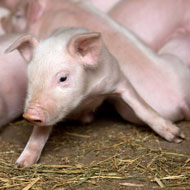‘Significant’ changes in pig sector’s antibiotic use

The rate of reduction in 2016 is a reflection of the work between veterinary surgeons and farmers to make “courageous changes”.
The amount of prescribed antibiotics administered in feed for young pigs has more than halved since 2014, according to data collected from the UK’s major feed compounders.
At the start of 2014, 37 per cent of all feed for young pigs contained a prescribed antibiotic, but by the end of 2016 this had fallen to 18 per cent.
Two thirds of the reduction took place last year, showing an increase in the pace of change, according to RUMA, who announced the findings.
Paul Toplis, who represents the Agriculture Industries Confederation (AIC), said while these figures cover just one area of the sector, antibiotic prescriptions dispensed through feed to young pigs represent a large proportion of use. The rate of reduction in 2016 is a reflection of the work between veterinary surgeons and farmers to make “courageous changes”, he added.
President of the Pig Veterinary Society, Susannah Williamson, stressed the importance of veterinary expertise in assessing disease risks and implementing appropriate methods of control. She said: “These need to be tailor-made to suit each individual farm and the effects monitored to ensure that initiatives to reduce antibiotic treatment also promote good pig health and welfare.”
Mr Toplis also noted that some of the reductions appear to have been made possible through the use of zinc oxide. When added to feed at medicinal levels it can protect the gut from E. coli bacteria, thereby reducing the need for antibiotics in pigs.
Commenting on the results, RUMA secretary John Fitzgerald said: “These data show there is a clear drive to use antibiotics more responsibly and to work alongside the human medical community in reducing, refining and replacing use of antibiotics globally – as well as building on the successful 10 per cent reduction in UK farm animal use in 2015.”



 The latest
The latest